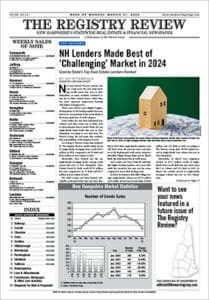
Even as some climate adaptations, like heat pumps, insulation and EV chargers, become selling points for homes, New Hampshire homebuyers’ decisions still aren’t being dramatically shifted by climate change. iStock illustration
Concerns about climate change are being shoved to the side by homebuyers desperate to acquire a house or condominium in today’s super-tight real estate market.
Residential agents and brokers in the Granite State say they’re fielding only a few inquiries from buyers about climate-change matters – despite recent ‘extreme weather’ incidents, such as wildfires in Canada attributed to warming temperatures around the globe whose effects along the East Coast dominated national headlines this month.
Some buyers do ask questions about coastal flooding and erosion, while others express interest in homes with carbon-reducing features such as solar panels, heat-pump systems, new insulation materials, and electric-vehicle chargers.
For the most part, though, buyers are laser-focused on simply purchasing a home amid intense competition caused by a lack of supply of houses and condos for sale in New Hampshire, real estate officials say.
“The lack of supply doesn’t allow people to be picky,” said Joanie McIntire, an associate broker at Coldwell Banker-J Hampe Assoc. in Concord. “There’s not a lot of room to be choosy in this market. People just want to buy a home.”
‘People Need Housing’
Ben Cushing, 2023 president of the New Hampshire Association of Realtors and vice president and regional manager of the Upper Valley at Four Seasons-Sotheby’s International in Hanover, agrees that the fierce competition to buy homes is clearly shoving aside most climate change questions that homebuyers may have about houses and condos they’re thinking of acquiring.
“People need housing,” he said. “Because we’re in such a [supply] crunch, it’s overriding concerns about other matters, such as climate change.”
The seeming disinterest in climate issues, when it comes to buying residential properties, isn’t limited to New Hampshire.
Real estate experts in nearby Massachusetts also report that the intense competition to buy homes, caused by a lack of houses and condos for sale, is outweighing most climate-change concerns.
“Homebuyers are too busy outbidding each other for homes,” Kristen Ruggiero, a RE/MAX Platinum agent in Bridgewater, Massachusetts. recently told The Registry Review’s sister newspaper, Boston’s Banker & Tradesman. “Climate-change [issues] are not a priority for them. It’s not something people are talking a lot about. Most of them are just looking for affordable homes.”
Climate Costs Expected to Rise
Craig Foley, a broker with LAER Realty, which operates in the Boston area and in Southeastern New Hampshire, said the real estate industry across the country is only in the early stages of making climate-change a top priority. Foley also owns a side business called Sustainable Real Estate Consulting Services.
He noted that of the 1.5 million licensed real estate brokers in the U.S., only half of 1 percent have gotten the NAR GREEN designation, designed to improve agents’ knowledge of energy efficiency and sustainability in real estate.
“We have a long way to go,” said Foley. “There’s been movement toward a better understanding of real estate sustainability, but we need to do more.”
Industry leaders say that, sooner or later, climate change will make its presence felt within the New Hampshire real estate market, if events in the West and elsewhere are any indication.
Citing an increased risk of natural disasters, State Farm Insurance and Allstate Insurance recently announced they were no longer going to sell new homeowners insurance in California.
In Arizona, state officials recently announced their intention to halt developers from constructing new subdivisions in the Phoenix area, due to a shortage of groundwater caused by overuse, drought and climate change.
Meanwhile, the recent wildfires in Canada – with their smoke drifting over large swaths of the Northeast, causing widespread health-care woes – are also being attributed to more extreme weather caused by climate change.
Daryl Fairweather, chief economist at listings portal and brokerage Redfin, said the long-term costs of climate-change are clearly starting to be felt in the real estate industry, from rising home insurance prices to increasing funds spent on climate resiliency improvements.
“Climate change is going to make housing more expensive,” Fairweather said. “It’s tied to the higher cost of maintaining a home.”
What Agents Can, Can’t Say
Janet Sylvester, the broker-owner of Great Island Realty in Portsmouth, said buyers eyeing ocean-area properties have long asked questions about coastal erosion, flooding, home insurance and other related issues – and they’re asking more questions of late due to climate change.
“It’s worsening,” she said of coastal issues in general. “People are concerned.”
But Sylvester stressed that those are the only large concerns being expressed regarding climate change.
People are perhaps more interested in solar panels and heat pumps. “But it’s not that prevalent,” she said. “It’s not some big, huge trend of people wanting them.”
As for possible inland wildfires in New Hampshire, which could get more likely as the state sees more frequent summers like 2020’s extended drought, she said: “They’ve never been an issue before. I’ve never heard about them being an issue for [homebuyers].”
As for how climate-change currently impacts real-estate professionals, Foley said it’s critically important for agents and brokers not to make predictions or promises to buyers about how global warming might locally unfold in coming years.
Otherwise, they may be opening themselves up to future legal actions by angry homeowners later hurt by climate change, he said.
Cushing agreed that agents and brokers must be cautious in what they say about climate change, since no one truly knows exactly how global warming will play out.
“We’re not the experts,” Cushing said. “I tell Realtors that they’re the ‘source of the source’ for climate information. We can direct them to the right place to get information. If you’re not 1,000 percent sure about something, don’t provide them with information – just guide them to information.”

